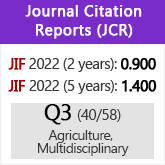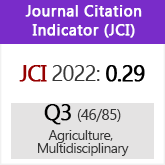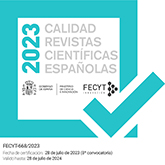Carbon losses by tillage under semi-arid Mediterranean rainfed agriculture (SW Spain)
Abstract
Conservation tillage has been promoted as a solution to counteract constraints caused by intensive agriculture. In this work the effects of two conservation tillage systems, reduced tillage (RT) and no-tillage (NT) were compared to the traditional tillage (TT) in a long- (15 years, RT) and short-term experiment (3 years, NT). Both experiments were carried out under semi-arid, rainfed agriculture of Mediterranean SW Spain. Tillage caused a sharp increase in soil CO2 emissions immediately after tillage implementation, with a maximum value of 6.24 g CO2/square m/h under long-term TT treatment. Along the year, losses of carbon through CO2 emission were higher (905 and 801 g C/square m/year for the long- and shortterm TT treatments respectively), than those estimated for conservation systems (764 and 718 g C/square m/year for RT and NT respectively). Conservation tillage systems accumulated more soil organic carbon (SOC) in surface than the corresponding TT treatments (1.24 and 1.17 times greater for RT and NT, respectively, at 0-10 cm depth). Despite SOC accumulation would be moderate other variables related to soil quality, such as dehydrogenase activity, can be consistently increased in soil surface in conservation tillage, as the stratification ratio values indicated. Crop yields in conservation tillage were similar to or even greater than those obtained in TT. The agricultural (soil quality) and environmental (less CO2 emission to the atmosphere) benefits derived from conservation tillage make this system recommendable for semi-arid Mediterranean rainfed agriculture.Downloads
© CSIC. Manuscripts published in both the printed and online versions of this Journal are the property of Consejo Superior de Investigaciones Científicas, and quoting this source is a requirement for any partial or full reproduction.
All contents of this electronic edition, except where otherwise noted, are distributed under a “Creative Commons Attribution 4.0 International” (CC BY 4.0) License. You may read here the basic information and the legal text of the license. The indication of the CC BY 4.0 License must be expressly stated in this way when necessary.
Self-archiving in repositories, personal webpages or similar, of any version other than the published by the Editor, is not allowed.















